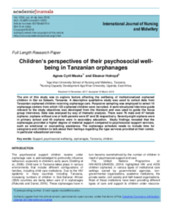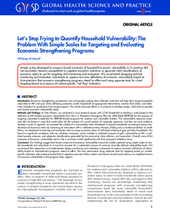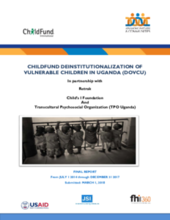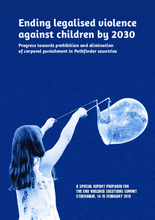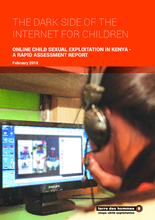Displaying 301 - 310 of 665
The aim of this study was to explore factors affecting the wellbeing of institutionalized orphaned children in Dar es Salaam, Tanzania.
This article discusses efforts in 3 countries to develop simple, valid tools to quantify and classify economic vulnerability status.
This final report on the “Deinstitutionalization of Vulnerable Children in Uganda” (DOVCU) project identifies its successes as well as some shortcomings and key learning that is directly relevant to other projects working to support family care for children.
The purpose of this study was to investigate how orphans in secondary schools, especially those in the low-income class in society, manage to continue their education.
In this study Child Living Conditions which take on many dimensions are computed using the intrinsic value approach. The authors tested the hypothesis that the average living conditions of orphans were less than the average living conditions of non-orphans in Uganda in 2011.
This paper aims at describing how caregivers at an institution for motherless infants in rural Tanzania perceive infancy, caring and sensitivity in their everyday context.
Prepared for the Agenda 2030 for Children: End Violence Solutions Summit, held in Stockholm, Sweden, on 14-15 February 2018, this report tracks progress towards prohibition and elimination of corporal punishment of children in Pathfinding countries.
Terre des Hommes Netherlands has conducted this preliminary study to examine if there is evidence of Online Child Sexual Exploitation (OCSE) in Kenya.
This paper discusses findings from a small-scale qualitative study conducted in Harare, Zimbabwe. Findings show that young people aging out from Harare’s care institutions face challenges making their transition from care into adulthood.
In this study, the authors examined the process of how relationships are built between Ethiopia adoptees and their adoptive families within the new family setting.

